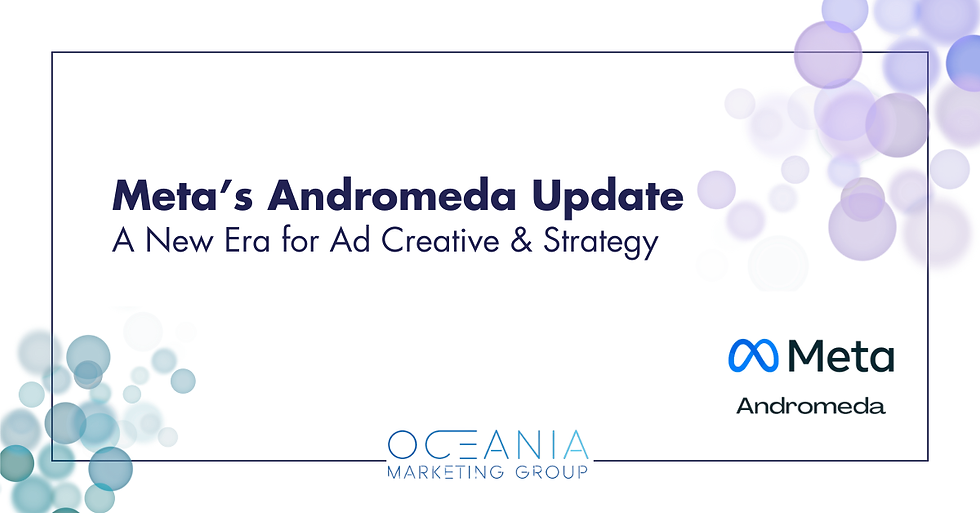Practical Guide to Mastering Meta’s Andromeda Update
- Karen Lewis
- Oct 30, 2025
- 3 min read

The Andromeda Update - what you need to know.
Meta has changed the game. Again.
The Andromeda update shifts Meta advertising away from granular campaign tinkering toward simplified structure and intentional creative variety. If you continue running the old “test a few hooks” playbook, you will struggle to scale. Meta is no longer rewarding incremental creative tweaks. It is rewarding meaningful diversity in ideas.
As a digital strategist working hands-on with dozens of Meta Ad accounts each month, I want to break down what business owners and advertisers must shift to stay competitive.
1. A Clean Campaign Structure Wins
The cluttered structure of the past (multiple campaigns for one objective, heavy duplication) now does more harm than good.
What Meta wants now
1 Campaign
1 Ad Set
8–12 distinct creatives
A single data pool gives the algorithm far better behavioural understanding and performance predictability. The days of budget cannibalisation and slow learning are behind us if we simplify.
Why this matters for your business
Faster optimisation
More efficient spend
Clearer view of what is driving performance
2. Creative Diversity Is Now the Number One Success Factor
Small copy swaps or image colour changes do not count as “testing” anymore.
The algorithm needs:
Different visuals: short-form video, UGC, strong images, carousels
Different messaging angles: emotional, rational, aspirational
Different value drivers: urgency, social proof, education
Meta is matching creatives to people, not masses. Your strategy must reflect that reality.
3. Introduce the P.D.A. Framework
A simple system that brings structure to creative development:
P – Persona: Who exactly is this ad talking to? Identity, situation, fears, motivation.
D – Desire: What emotional transformation do they want most? Health, confidence, status, time, security, peace of mind.
A – Awareness: Where are they in the buying journey? Unaware → Problem-aware → Solution-aware
Each creative must speak to one Persona, one Desire, at one Awareness stage. That is how Meta learns faster and finds your customers quicker.
4. Budget Patience = Performance Stability
Do not double budget overnight. Increase ~20 percent per day. Meta needs consistency to learn without “CPA shock”.
Businesses that panic and change too frequently are the ones burning money.
5. Measure Success Differently
Andromeda optimises for behavioural signals, not just conversion events.
Expect more:
Saves
Shares
Longer video views
Landing page dwell
These early signals feed the winning ads you scale later.
What Should Businesses Do Right Now?
✅ Collapse unnecessary campaigns
✅ Build out 8–12 creatively distinct concepts
✅ Apply the PDA framework to every ad
✅ Scale patiently
✅ Track new engagement signals
✅ Trust the learning phase
Meta wants to do the heavy lifting. You just need to give it meaningful inputs.
This is not harder. It is smarter. Your simplified structure + creative diversity = your growth advantage.
If you want support re-engineering your Meta campaigns to perform under Andromeda, Oceania Marketing Group is here to help.
TL;DR — What You Must Change To Win With Meta Andromeda
Use 1 campaign + 1 ad set + 8–12 different creative concepts
Test different ideas, not minor tweaks to one concept
Build messaging using the P.D.A. framework Persona (who), Desire (what they want), Awareness (where they are in the buying journey)
Scale budgets slowly (max 20 percent per day) for stability
Focus on behavioural signals like saves, shares and dwell time, not just last-click conversions
Commit to consistency and patience during learning phases
In short: simplify structure, diversify creatives and trust the algorithm to do the heavy lifting. This is the fastest way to achieve reliable, scalable performance under Andromeda.
%20(18).png)





.png)


Comments